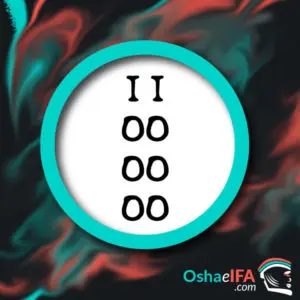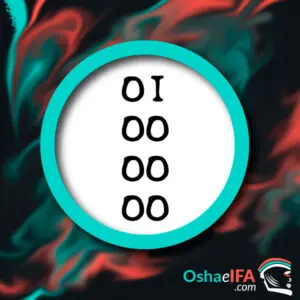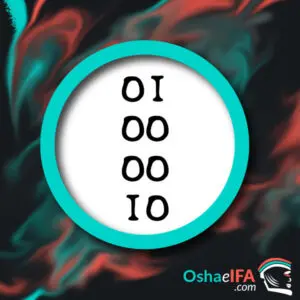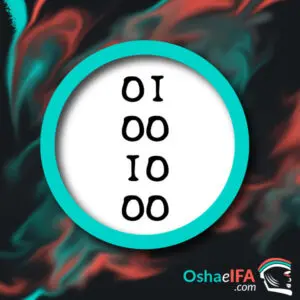Obara She: Meaning, Tips, Sayings, Patakies and More

Obara She is Odu # 120 of the Lordly Order of Ifá. Ifa talks about the ways to control the forces of nature. The person needs cleaning to get rid of negative energy.
This is where: The learner observes the teacher. Where the Babalawos wanted to know more than Orúnmila. Where the teacher has to take measures so that the student does not keep everything hers.
Treatise of the Oddun of Ifa Obara She
Other names for Obara Oshe:
- Obara She.
- Obara Moroche.
In the odu Obara She is born:
- The stinger to the bees to defend themselves.
- Born: Good and Evil.
- They are born: The tamales.
- Here: It is where the learner observes the master.
- The Babalawos wanted to know more than Orúnmila.
- It is where the teacher has to take measures so that the apprentice does not take everything his own.
- Talk about gossip and slander.
- You cannot untangle skeins or eat tamales.
- The bees had a hard time feeding themselves.
- This is the mud house.
- It is where children disappoint their parents, when they lose the illusions placed in them as a child.
- A honeycomb is put on Shango.
- The person has a dead person who speaks in his ear and gives him the virtue of divination.
- You have to receive Oyá and Azojuano. (Saint Lazarus)
- Evil surrounds good. Evil and good are in the same person.
The sign of Ifa Obara She marks:
- You have to take care of your brain.
- You have to keep Egun and Osha at the same height.
- Talk about the development of the sixth sense.
- The bush is shaken, the leaf that is good stays the one that is bad falls off.
- It is where the Egun to manifest itself needs a person to engage it.
The oddun Obara She 6-5 points out:
- For health you have to get sarayeye with a little parguito and grass: poplar and atiponlá.
- You have to do a great work with a language at home.
- Talk about the development of the sixth sense.
- The herbs are: Rubber, pandora, taveque, white Christmas gift, guano leaf, white jia.
- Talk about Abikú.
It may interest you: Treaty of Oddun Obara Meyi
Recommendations of the Ifa Obara Oshe sign:
Here for a woman, not for an Abikú, an Ebo is made in the mountains with a goat. This is given in the mountains at the foot of a bush and the woman's head is cleaned or washed with Kuakanshela grass (maroon vine), water, soap, cocoa butter and the blood of the goat. The goat is sacrificed to Shidoku, the king of the Abikúes.
In this Ifá a woven belt is prepared with threads of the four ritual colors and it is washed with Omiero de Jobo, Espantillo and a jicotea is given along with Shango and then it is worn around the waist.
In addition to Shango a honeycomb is put on him.
In this Ifá the person has an Egun that speaks to him in his ear and gives him great divinatory virtue. If you hear it, you will progress more. TO
Shango puts a snail in the shape of an ear on the tray and later loads it and uses it on top.
For this Odu one is the son of envy and betrayal. You have to take care of your feet. Don't tangle or untangle gossip.
Obara Oshe in Ire:
When he is Iré, the person with this Odu must live in the country, when he is oboso he must live in the city.
The Osha who asks for it must be played a fundamental drum.
For an Awó or Aleyo with Awafakan, his Osobo are women with blue eyes.
Because of this Odu "Obara She" the person's belly is thrown out.
This is an Odu of Abikú, so his children are Abikú, because the father and mother are also.
Here you mourn for the children who have died and that they were all Abikú and they are always persecuting you. That is why it is necessary to do work on the mountain and wash his head with the aforementioned for these cases.
The Obara She 6-5 sign for women:
She has more than one husband, who calms down and does not run so much, here and there with men, so that he is free from serious sexual diseases and tragedies. Her husband or her lover wants to kill her. You should also treat your husband with affection and do not abuse him with words.
Obara She Sayings:
- For outside, for the patio, which hurts you.
- First taunts and then insults.
- He entered as an apprentice and wants to be a teacher.
- The tongue that eats salon can spit sweet.
- Uncontrolled talking and immature plans cause pain in the shins.
- A quiet tongue makes a wise head.
Ifa Code of Ethics of the Oddun Obara She:
The learner learns by observing his teachers.
Obara She bans:
It must be said in this Odu that money does not solve everything, a clean heart and a clear conscience are better than bad money. Nor can you be proud and not make fun of someone who knows less than you.
You have to be careful in teaching a person, who later will know more than you and can harm him. Obara She cannot teach.
For this Odu you have to wear a parrot or parrot feather on your head. Obara She cannot say that she knows, because she remains gross because nobody teaches it.
You have to receive Oyá and Azojuano, and serve the Eguns. This is where the Egun to manifest needs a person to engage it. You have to have Egun and the Saint at the same height.
For this Odu we must count on Eshu a lot and take care of him especially.
This Oddun speaks of the development of the sixth sense. It is the Ifá of saving lies and it is the truth that brings out the light that is the good among all. Birth of good and evil. Evil surrounds good. Take care of the good you have. Evil and good are in the same person. It is a magnet that attracts good and evil.
You have to take care of your brain, which is the most important organ that a person has.
You have to be careful not to raise your hands to people, with sticks, stone or another element, because it kills you and you will go to prison.
Olokun must be received through this Odu, for his prosperity.
Meaning of the Obara She Sign
Tamales are born. Secret for the Odu: The head with fruits and the feet with tamale are requested.
This Oddun speaks of gossip and slander. It cannot untangle skeins or tamales. The house is swept to a corner of it and on that garbage is put to ESHU, then everyone is cleaned with a chicken and it is given to Eshu right there.
Here the sting was born to the bee to defend itself, but when it uses it it dies. It was also difficult for the bee to feed itself, there are times when you lack food.
«Onile Alafia Obara Shé fun Kuakuá ni Omó Shango Omó Obatalá oni Shango ba that onile Onile Alafia».
Onile Alafia: It is the name of Shango, who is the same son of Obatalá, who when he rages the earth shakes.
The mud house speaks here. This is where children disappoint parents, when they lose the illusions placed on them since childhood.
The sign of Ifa Obara Oshe speaks:
When this Odu appears in an ordinary record, the person will be warned that he must be patient and humble in the businesses or trades he is learning so that he can know everything about the profession. You should avoid bragging about your knowledge.
When this Odu appears in an ordinary register, the person is advised that he must make his confidences known to his servants so that they can help him. They can solve your problems for you.
When Obara She appears in an ordinary record, the person will be warned that they must make sacrifices so that the problems they have at home and in their workplace will end.
When this IFA appears on IGBODU, the person will be traveling soon. However, before traveling, you must serve your IFA with a ram in order to return home with the gifts you will get during your trip. In an ordinary registry the person must serve Eshu with a goat.
If the Oddun Obara She appears in an ordinary record, the person is told that in his family there is a person suffering from infertility who is crying desperately for having a child. She must make sacrifice to have a child. She is destined to give birth to a powerful child.
It may interest you: Odu of Ifa Oshe Bara
Says Ifa Obara She:
That you Hold your tongue a little because they can kill you; You. You are cheating on a person and that person wants to inherit it; You. You come here because you. He fought with his wife and now you. He wants to return to take revenge and if you. He manages to make amends, he has to treat her well and with affection so that both of them are lucky.
He says that he does everything with money, but Orula says that it is better to have a clean heart than money; beware of pride and do not make fun of someone who is less than you.
He has spoken a lot about the saints and for that reason it is for you. Everything breaks down; You. New clothes have been made, which his enemies do not want him to wear; You are cheating on a person who wants to entangle you because he wants to know more than you. Put a parrot feather on your head and if you are a man you will wear it on your hat.
Prayer of the Oddun Obara Oshe:
OBARA SHE OFUTERE OBARA SHEKE ODILARA KORUGBO OGUNSHE AWO OBARA OBASHE AWO EYELE AWO OUN AWO KAFEREFUN OBA KAFEEFUN ODU KAFEREFUN ORUNMILA.
Ebbo from Obara She 6-5:
For a woman not for Abikú.
An Ebo is made in the mountains with a goat. This goat is given in the mountains at the foot of a bush and its head is cleaned or washed with Kuakanshela grass (maroon vine), water, soap, cocoa butter, and the goat's blood. The goat is given to Shidoku, the king of the Abikú.
Herbs (Ewe) of the Oddun Obara Oshe
Cimarrona Vine, Aberikunlo, Quita Curse.
Pataki of the Obara She sign:
The divination was made before Obara She him left Heaven.
Before he left for the World, he was warned to make sacrifice because he was going to be very prosperous, but he would also simultaneously have many problems. He was told that the sacrifice would be made in Orita-Ijaloko with a bundle of yams, a bunch of bananas, corn and ground yams, and a bag of coins. He performed the sacrifice and went to where God was to receive the blessing before leaving Heaven.
When he arrived on Earth he began to work the land and practice Ifism. No, she was doing very well and couldn't afford the marriage for long. He invited other Awoses to do divination for him and tell him what to do to end this situation. He was told to make sacrifice with a bundle of yams, corn, a bunch of bananas, and a bag of money.
He was told to decorate his Ifa altar and serve it with a hen and give a coconut to his head. He was so poor that he had to borrow fabrics to decorate his altar. When he was slaughtering the hen to his IFA the blood stained the borrowed cloth. Later he returned the fabrics to the woman who had loaned them adding some drinks and kolanuts. One day, he was standing in front of his house early in the morning when he saw Obá's daughter, named Seke, passing by. She greeted him and after an exchange of greetings, she explained that she was coming to visit him. He brought her home and she told him that she came to offer herself in marriage because she had observed that he had not had a wife for a long time. He replied that he was a poor peasant and did not have the money to support a wife. She insisted on marrying him anyway.
After living with him for four days, she decided to return home to inform her father of her decision. She told him that she had met a man and that she wanted to get married. The father asked him to invite him to the house to meet him. She returned to Orúnmila's house and told him that her father wanted to meet him. He didn't want to go because he didn't have presentable clothes. She insisted that he was not invited to a show in rich clothes and that he had nothing to fear. Following this reasoning, he decided to go with her.
When they reached the palace, the King found Obara Oshe very handsome. He immediately agreed to the marriage and called his treasurers to collect jewelry for his daughter and bring it to her husband's home. The King told him that he did not have to give any dowry, but that he should pay her with an annual tribute for himself. After blessing the marriage and asking for the couple, they left.
While the wife traded with the capital that her father had given her and her farm also began to flourish. Soon he was able to build his own house. At the end of the year, he collected the best yams from his farm and sent them to his father-in-law with bananas, corn, and kolanuts. He made his wife sell a lot of yams in the market. While at the market, Olokun's daughter found the yams very attractive and when told that he was from Obara She's farm, she promised to meet him.
When the market cleared, Olokun's daughter took her bag and went with the Akpetebi to meet Obara She. They did not know that the visitor was Olokun's daughter. Before leaving the market to go to Obara She's house, she dismissed the pay that accompanied her to the market and told them that she would return in five days.
After exchanging compliments with Obara Oshe, Olokun's daughter told him that she had come to marry him. He replied that he had nothing, that he was a simple farmer. Yet she insisted that the farm was enough. Five days later she left promising to return with her belongings.
It was after she returned with her luggage and riches that they realized that she was the same daughter of Olokun. Later he told Seke, the man's wife, not to go to the market anymore.
That from that moment on she would trade for the family. Later Obara She became a very prosperous character. When the King saw how prosperous Obara Oshe had become, so did Shasere and Prime Minister of the kingdom.
Teacher.
Obara Oshe Story 6-5
In the Moroshe village, there was an Awó who had a large clientele, a product that made his predictions come true. This Awó was a great scholar regarding the stories and works of Ifá, which he explained to his godchildren.
Once he decided to teach his godchildren, who took it with great interest, within them there was one who excelled in learning, but had things on his mind that were harmful to him. When this boy was learning, he prepared a strategy to stay with the religious temple of his Master.
The Awó, realizing that one of his students were planning something, looked at himself with Ifá coming out with this Odu that told him that he had to be careful with an apprentice and that if he did not take action, he was going to lose everything that with so much work he had obtained. He also told him to make Ebo with Gallo, two hens, a guinea, threads of all colors, an arrow, a trap and other ingredients. He made the sacrifice and the outstanding student left for another land.
Obara She Ifa Traditional Nigerian
ÒBÀRÀ ÒSÉ
Òpéèré Awo ile Onídòko
Ló día fun Onídòko ní kùtùkùtù Àwúrò
Níjó tí Olóbàrà n lo rèé fé omo Onídòko pàá
Wón ní kó rbo
Wón ní omo won kan n be to you toó lókó
Wón ní Awo ló loin òhún
Won ò rubo
Òbàràòsé bà sawo de ilé Onídòko
Ó bá lóun fé féé omo Onídòko
Ngbà ó to gégé ìgbà tí omo ó móo lo ilé oko è
Won ò bá gbo ohun tí Bàba Onídòko n so mó
Won ò gbó ohun tí Ìyá Onídòko n wí mó
Òpéèré sì ti dá Ifá fun Onídòko télè
ni bá n pé
Omo Onídòko ò
Omo Onídòko ò
Omo Onídòko ò níláárí
N ni Òpéèré n wí tée dòni
Wón ní nígbà tí Onídòko ò fomo è fun Awo mó ni
Òpéèré Awo ile Onídòko
Ló día fun Onídòko ní kùtùkùtù Àwúrò
Níjó tí Olóbàrà n lo rèé fé as Onídòko
Omo Onídòko ò wáá fé e mó
Òpéèré nlé or Awo ilé Onídòko
Ó n bu Ìyá Onídòko
Ó ní Ìyá Onídòko ò níí yes
Òpéèré nlé or Awo ilé Onídòko
Ó n bu Bàbá Onídòko
Ó ní Bàbá Onídòko ò níí yes
Òpéèré nlé or Awo ilé Onídòko
A ko omo Onídòko
A ò faith mó.
The good fortune of wives is foreseen for this person. He must offer sacrifice so that he can find peace and be well. The father and mother of the person to whom this Odù is revealed wish to marry a daughter or a daughter intends to marry. Ifá advises both of them to be cautious and not be bothered by the husband that their daughter chose. They should agree with your choice so that later they do not regret it and so that the husband does not decide to play a bad joke on the parents later.
Òpéèré is the priest of the house of Onídòko
He made divination for Onídòko at the beginning of his life
The day that Olóbàrà was going to marry the daughter of King Onídòko
He was advised to offer sacrifice
They said that the daughter is mature enough to marry
They advised him that he should marry a Babaláwo
They didn't make the sacrifice
Òbàràòsé then went to venture his priesthood in the house of Onídòko
And he became interested in Onídòko's daughter
When it was time for her to get married
The father of the bride changed his promise
The mother of the bride did too
While Òpéèré who had made the divination for them initially
Start to sing
Onídòko's daughter
He screamed: Onídòko's daughter
Onídòko's daughter is useless
It is what the bird Òpéèré continues to say to date
They reasoned "This is because a Babaláwo will not be able to marry the daughter again."
Òpéèré is the priest of the house of Onídòko
He made divination for Onídòko at the beginning of his life
The day that Olóbàrà was going to marry the daughter of King Onídòko
Onídòko's daughter now that she refused to marry him
I greet Òpéèré, the priest of Onídòko
He was abusing Onídòko's wife
He said that Onídòko's wife would stop being him
I greet Òpéèré, the priest of Onídòko
He is abusing Onídòko
He said that Onídòko would cease to be
Òpéèré, I greet you, the priest of Onídòko
We have rejected Onídòko's daughter
We will not want her again.
Eshu of the sign Obara She:
Undefined.














